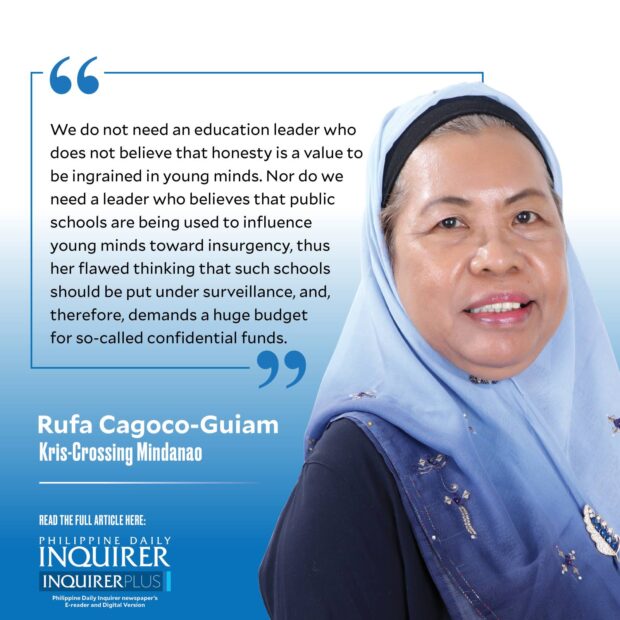What an education secretary should not be

Basic education is at the core of a country’s overall social development. Institutions tasked to carry out the mission of educating a country’s children must ensure that character formation is hardwired into the mindsets of our youth, starting at their early education levels. Self-discipline, concern and empathy for others, recognition and tolerance for diversity, honesty and trustworthiness, rationality in the things we do; and living in harmony with nature—both its living and nonliving elements—are among the basic values that are forged early in life, not later. Values are harder to catch later in life, especially when such values have established for some people a comfortable and opulent lifestyle.
Forging desired ideals of a future where values of inclusion, tolerance for diversity, and just and fair treatment of other people begin early in people’s minds, including strength of character. All these are formed when minds are still in their malleable stage; when these are still soft and bendable to any ideal parents and teachers would like to instill in them.
When individuals are at their adult stage, it would be challenging to change their deeply ingrained mindsets, let alone make them unlearn whatever flawed values they have picked up early in life, from both their parents and teachers in early education.
Values are better caught than taught, as an old proverb goes. Another learning dictum also tells us that we cannot give what we do not have.
Hence, it is important for a country to have an education leader who is knowledgeable in the principles of learning, re-learning, and unlearning so she can steer the department accordingly.
We do not need an education leader who does not believe that honesty is a value to be ingrained in young minds. Nor do we need a leader who believes that public schools are being used to influence young minds toward insurgency, thus her flawed thinking that such schools should be put under surveillance, and, therefore, demands a huge budget for so-called confidential funds. Definitely, we do not want a leader who is allergic to being questioned on how a huge budget of P125 million of confidential funds was disbursed swiftly—in a matter of 11 days only.
We also do not want a leader in education who puts up an image of being “compassionate” to young learners when she visits them in their schools, trying to project a populist image of being close to these impressionable youngsters even if she sits at the highest post in the country’s education hierarchy.
Nor do we need a leader who tends to use physical, brute strength when trying to show her concern for the “masa”—using her powerful fists to inflict a painful jab at one of her employees when she was a local chief executive before becoming a high-ranking national government official.
And definitely, we do not look for a political butterfly to take on one of the country’s biggest and most influential positions. One who switches political loyalty in the guise of being able to “serve the country” better is someone we cannot trust to be loyal to the country’s throngs of impoverished people. Aligning with those involved in anomalies and irregularities in running the national bureaucracy is already indicative of the kind of character a politician has—after all, it takes one to know one; it takes a thief to catch another.
Forging a “marriage of convenience” with another group just to ensure political victory is another undesirable quality of one who leads a bureaucracy devoted to the crucial formative stage of learning among our youth. Such types of alliances will soon fall through the cracks, since the basis for bonding together is not mutual respect; nor is it based on a deep friendship with each other.
We also do not need an education leader who admits that she does not know anything about education, but decided to accept the Department of Education portfolio, even if she coveted another position—that of defense secretary. Both portfolios are of course not within her range of expertise or qualifications to run either department.
Lastly, we do not need a leader in education who is part of a family whose patriarch has created a deep fissure among the entire Philippine constituency through his deadly war on drugs, and his staunch support for one fugitive from the law, and for foreign-based shadowy businesses like Pogos.
The fault of the father is not the fault of his children, and I agree. But when children wallow in the fruits of the faults of their father, and when they support the flawed advocacies of their father, then they are complicit in their father’s faults and are, therefore, manifesting the same flawed values their father has.
——————
Comments to rcguiam@gmail.com




















